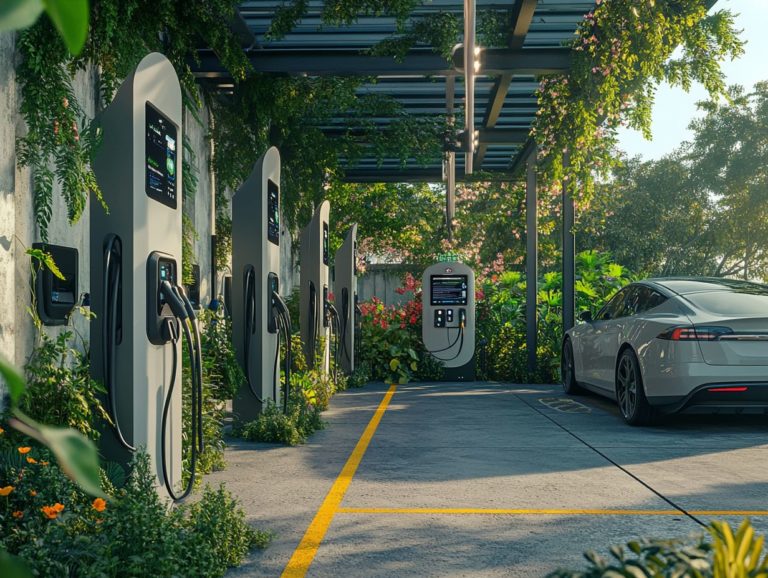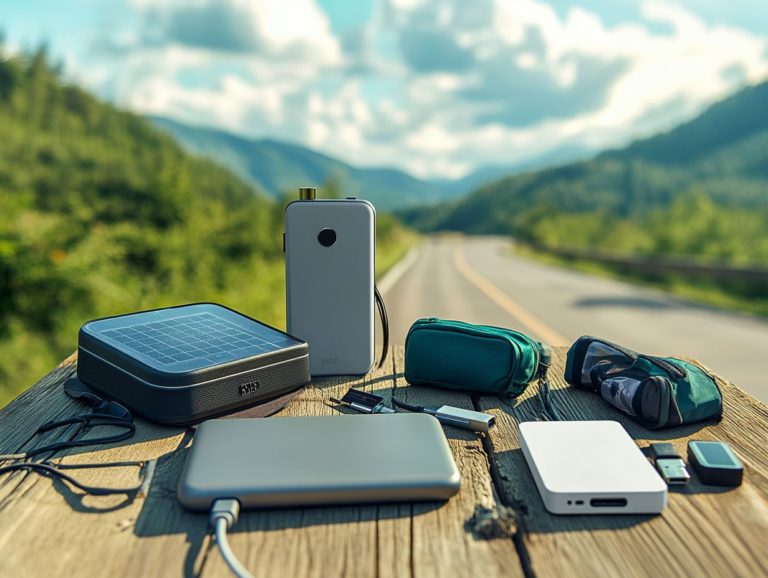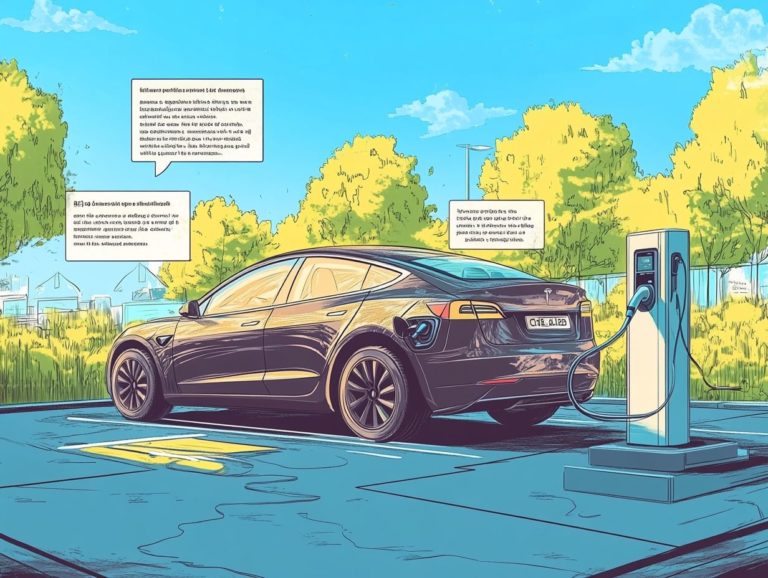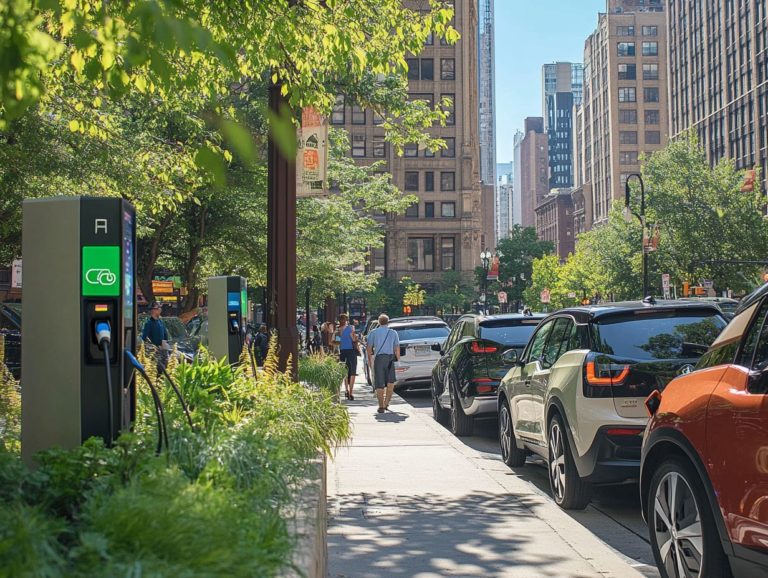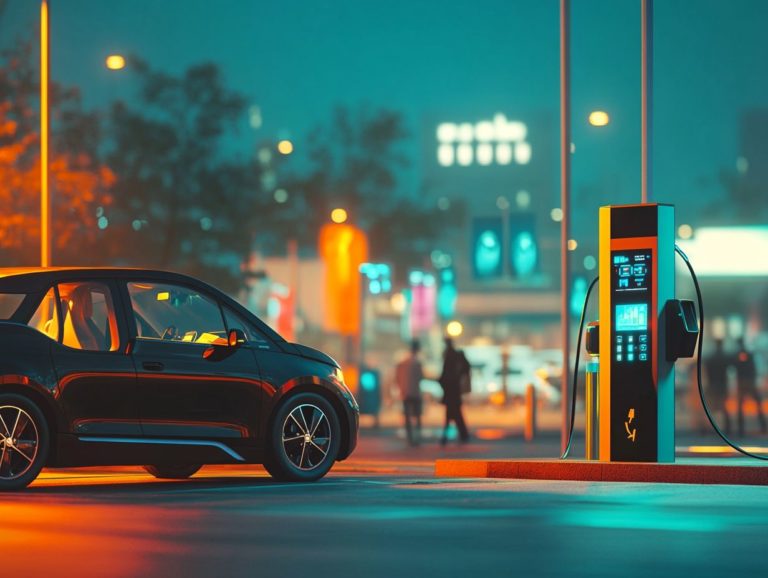10 ev charging faqs answered
Electric vehicles (EVs) are revolutionizing transportation, offering a cleaner and more efficient alternative to conventional cars. With a myriad of options and an expanding network of charging stations, the allure of making the switch is undeniable.
You probably have questions regarding charging logistics and costs. This article addresses ten frequently asked questions about EV charging, exploring everything from at-home solutions to savvy tips for finding public stations.
Dive into the world of EV ownership and discover essential tips that will enhance your experience!
Contents
- Key Takeaways:
- 1. What Is an EV and How Does It Work?
- 2. What Types of EVs Are Available?
- 3. How Do I Charge My EV at Home?
- 4. What Are the Different Types of EV Charging Stations?
- 5. How Long Does It Take to Charge an EV?
- 6. Can I Use a Regular Outlet to Charge My EV?
- 7. How Much Does It Cost to Charge an EV?
- 8. Can I Charge My EV at Public Charging Stations?
- 9. Are There Different Charging Networks for EVs?
- 10. How Do I Find EV Charging Stations Near Me?
- What Are the Benefits of Owning an EV?
- Frequently Asked Questions
- What is an EV charging station?
- Do all electric vehicles use the same type of charging station?
- How long does it take to charge an electric vehicle?
- Can I install an EV charging station at my home?
- Are all EV charging stations free to use?
- Can I use a public charging station for my electric vehicle if I am not the owner of the station?
Key Takeaways:
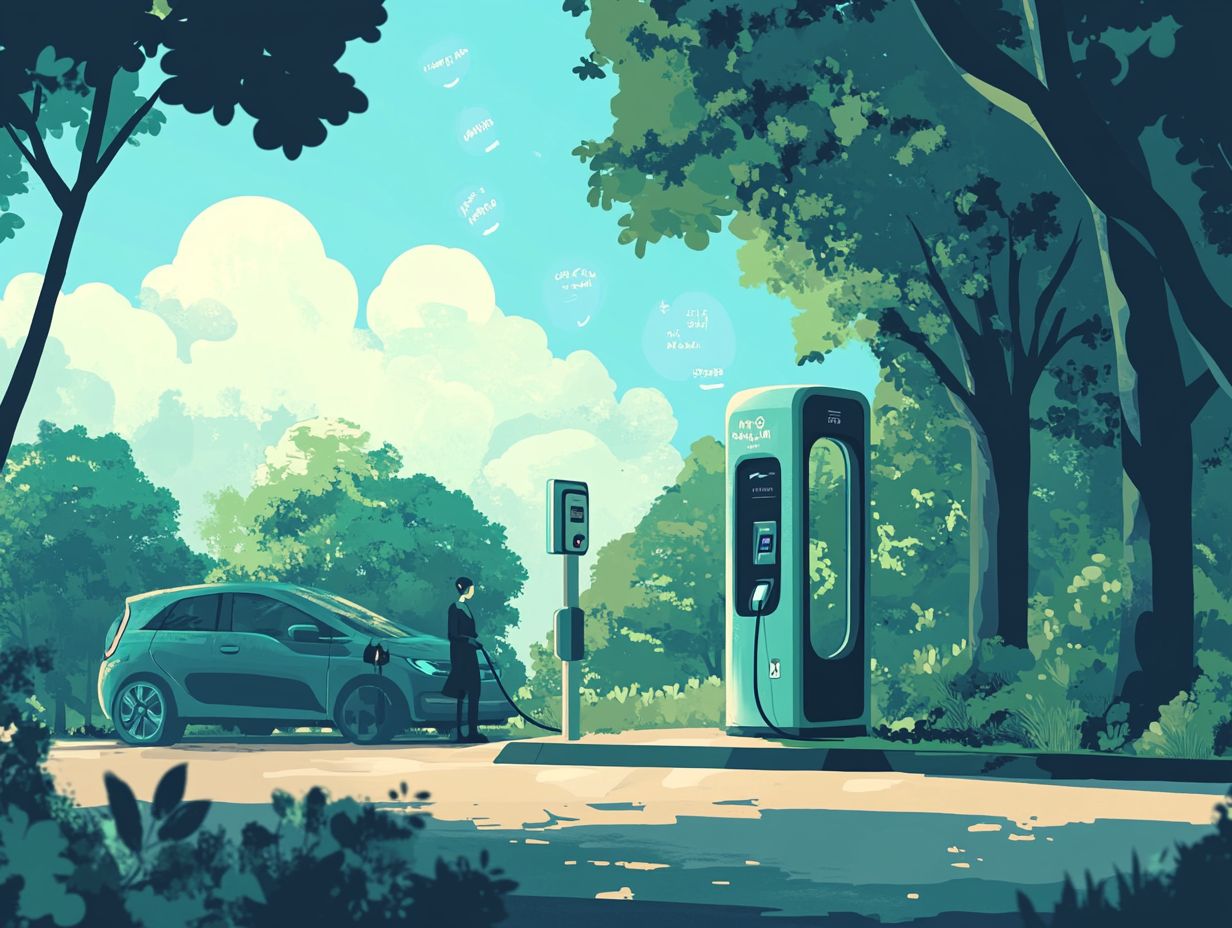
EVs are becoming increasingly popular and offer numerous environmental benefits. Understanding different types of EVs and charging options is crucial to ensure efficient and cost-effective charging. With proper care and preparation, owning an EV can be a convenient and sustainable transportation choice.
1. What Is an EV and How Does It Work?
An electric vehicle (EV) harnesses battery-powered electric energy, setting it apart from traditional gas-powered cars. This offers a more sustainable mode of transport.
There are various types of EVs, including:
- Battery-powered electric vehicles
- Hybrids
- Hydrogen fuel-cell vehicles
Each type has unique advantages in performance and energy efficiency. With advancements in EV charging technology such as stations powered by renewable energy electric mobility is becoming more accessible and efficient. This evolution alleviates concerns like range anxiety and encourages widespread adoption of electric vehicles worldwide.
At the core of an EV is its battery technology, primarily lithium-ion batteries that store energy. They supply power to the electric motor, enabling impressive acceleration and smooth movement. These motors convert electrical energy into motion, allowing for a quieter and more efficient ride compared to internal combustion engines. Plus, since EVs have fewer moving parts, they require less maintenance.
With options ranging from fully electric to hybrids that blend gas and electric systems, the operational mechanisms may vary, but they all contribute significantly to reducing greenhouse gas emissions and advancing cleaner transportation solutions.
2. What Types of EVs Are Available?
The market offers a compelling array of electric vehicles (EVs), each tailored to meet various driving needs and personal preferences. You can choose from battery-powered electric vehicles, hybrid models, plug-in hybrids, and hydrogen fuel-cell vehicles, ensuring something aligns perfectly with your lifestyle.
Fully electric cars, powered entirely by batteries, produce zero tailpipe emissions, making them an enticing option for eco-conscious drivers. If you seek a blend of traditional power with modern efficiency, hybrid vehicles combine a gasoline engine with an electric motor, providing better fuel efficiency without battery range anxiety.
For those desiring more flexibility, plug-in hybrids allow you to charge their batteries from an external source, offering a limited electric-only range before switching seamlessly to the gasoline engine.
Industry leaders like Tesla are at the forefront of fully electric technology, boasting impressive battery capacities. Meanwhile, Toyota is a household name in hybrids, and Daimler innovates with plug-in models that balance efficiency and convenience, collectively reshaping the sustainable transportation landscape.
3. How Do I Charge My EV at Home?
Charging your electric vehicle (EV) at home is not just convenient; it’s an efficient process tailored to your specific needs. You can choose between a level 1 charger or a level 2 charger, depending on your charging requirements and electricity supply capabilities.
Level 1 chargers plug into a standard 120-volt outlet and provide about 4 to 5 miles of range per hour perfect for overnight charging.
On the other hand, level 2 chargers operate on a 240-volt supply, delivering an impressive 25 to 30 miles of range per hour, making them ideal for daily use and quick top-ups.
Consider your EV s battery capacity and daily driving range when choosing. Level 1 chargers are generally less expensive and require minimal setup, while level 2 chargers may have higher installation costs due to necessary electrical upgrades.
4. What Are the Different Types of EV Charging Stations?
EV charging stations come in various types, ranging from level 1 chargers designed for home use to high-powered DC fast charging stations, like Tesla Superchargers, which offer rapid energy replenishment for your electric vehicle while you’re on the go.
Level 1 chargers provide a straightforward plug-in option, needing nothing more than a standard outlet. They typically deliver about 4 to 5 miles of range per hour, making them perfect for overnight charging while you sleep.
Level 2 chargers offer a stronger solution and are often found in public places such as shopping centers and workplaces. They provide around 10 to 20 miles of range per hour but usually require a dedicated electrical circuit for installation.
For those times when speed is vital, level 3 chargers, or DC fast chargers, come to the rescue! They can charge your EV to about 80% in roughly 30 minutes. You ll find these at fast-charging networks like EVgo and ChargePoint, designed to get you back on the road quickly.
These public charging stations are essential in supporting the expanding EV infrastructure, ensuring that both urban and rural areas are well-equipped to meet the rising demands of electric vehicle owners.
5. How Long Does It Take to Charge an EV?
The time it takes to charge your electric vehicle (EV) can vary quite a bit based on the charger type, battery size, and charging rates. Level 1 chargers typically require a much longer commitment compared to the faster level 3 chargers.
If you’re using a level 1 charger, which you ll often find in household outlets, you might be looking at up to 12 hours to fully recharge a 60 kWh (kilowatt-hour) battery. This makes it more fitting for overnight charging scenarios.
Switching to a level 2 charger lets you recharge in just 4 to 6 hours, offering a much more efficient solution when you’re in a hurry.
On the fast lane, level 3 chargers can juice up your EV to around 80% in just 30 to 45 minutes. This is especially beneficial during long road trips or when every minute counts!
Each of these charging levels has unique advantages, depending on your specific needs and battery specifications. Understanding the various charging options available, including common myths about EV charging, is essential for optimizing your EV experience.
6. Can I Use a Regular Outlet to Charge My EV?
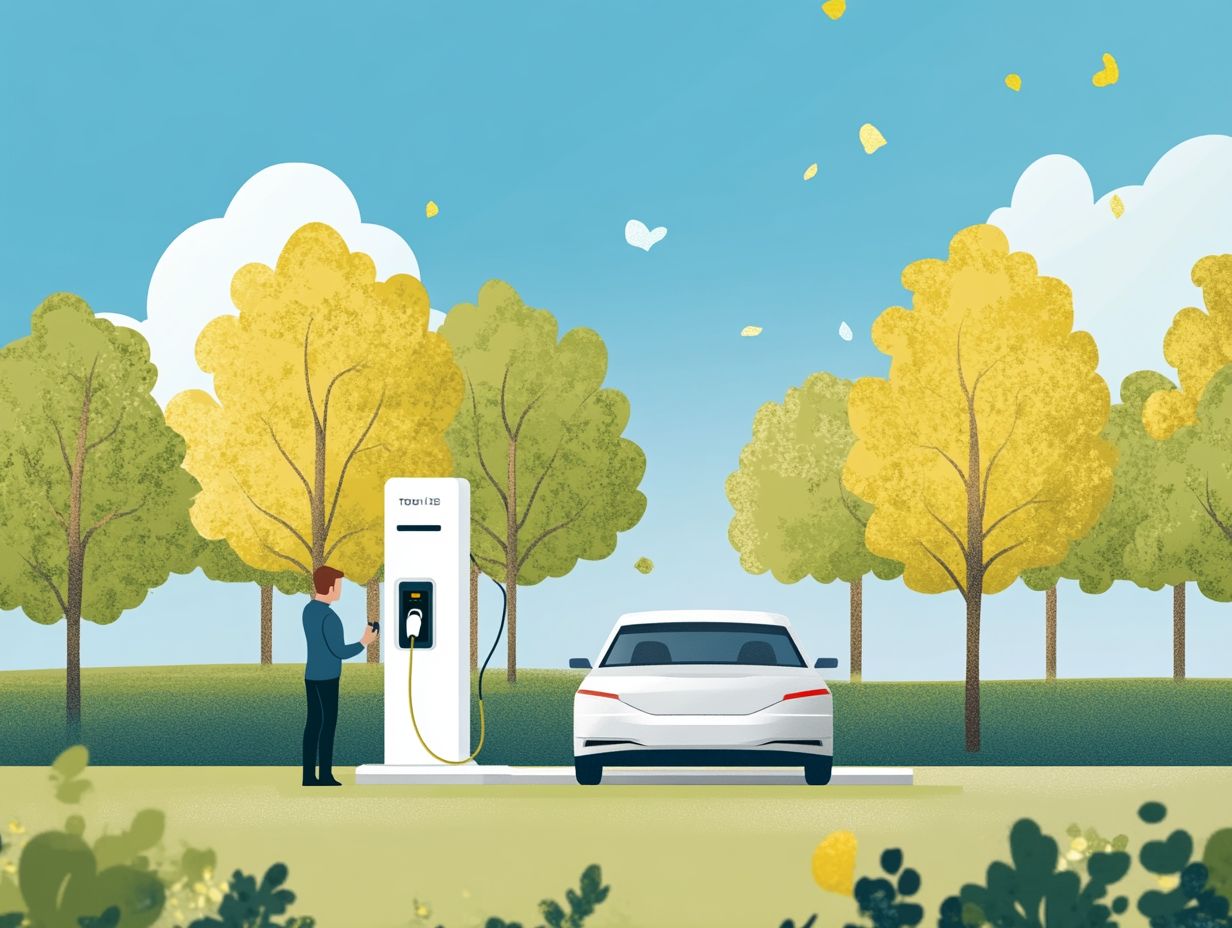
While you can technically charge your electric vehicle (EV) using a regular outlet with a level 1 charger, this approach leads to much longer charging times and might not be the most efficient choice for your daily routine.
If you are relying on a standard 120-volt outlet, prepare for charging times that can stretch anywhere from 8 to 20 hours for a full battery, depending on your vehicle’s capacity and the current charge. This slower pace may work for overnight charging. However, it can pose challenges if you frequently cover longer distances.
Plus, electricity costs can accumulate quickly, especially if you are using this method daily and rates fluctuate. While it might seem economical in some cases, it is not the best strategy for those who need quick turnaround times.
When you find yourself in situations where rapid charging is essential, consider alternatives like faster charging stations that can charge your battery more quickly than standard outlets.
7. How Much Does It Cost to Charge an EV?
The cost of charging your electric vehicle (EV) varies based on the electricity rates in your area, the type of charger you choose, and whether you prefer home charging or public charging stations. This gives you a diverse range of affordability as an EV driver.
Several factors can significantly influence these costs. For example, local utility rates can fluctuate, making it crucial to consider when charging at home.
More powerful charging stations, commonly found in public areas, tend to charge higher rates for electricity usage compared to standard home charging setups, which usually enjoy lower residential electricity rates.
The average time you spend charging can also impact your overall expenses. While rapid charging is undeniably convenient, it can lead to increased costs. By weighing the convenience of home charging against the costs incurred at public stations, you can gain a clearer understanding of where your greatest savings lie.
8. Can I Charge My EV at Public Charging Stations?
Charging your electric vehicle (EV) at public charging stations is not just possible; it’s the new standard! With an expanding network that includes options like Tesla Superchargers, EVgo, and ChargePoint, recharging on the go has never been easier for EV drivers. If you’re curious about the benefits, check out 5 frequently asked questions about EV incentives to learn more.
You will find these stations in a myriad of locations think shopping centers, parking lots, and along highways providing you with a dependable way to power up your vehicle when you are away from the comfort of home.
Public charging networks offer various types of stations, including fast chargers for a quick boost during a brief stop and Level 2 chargers ideal for longer durations, like while you enjoy a meal or shop.
Be aware of potential challenges, especially during peak hours! There can be possible wait times and uneven availability of charging stations in less populated areas, particularly when compared to the convenience and typically lower cost of charging at home.
9. Are There Different Charging Networks for EVs?
Yes, you will find a variety of charging networks for electric vehicles (EVs) out there, including Tesla Supercharger, EVgo, and ChargePoint, each with unique benefits and coverage to enhance your charging experience.
Take Tesla Supercharger stations, for instance; they are strategically placed along major highways, making long-distance travel a breeze and minimizing your downtime essential for those memorable road trips.
On the other hand, EVgo shines in urban settings, providing rapid charging options that perfectly cater to city dwellers in need of a swift power boost while they are out and about.
Then there is ChargePoint, boasting the largest network of Level 2 chargers, ideal for home and workplace charging, which is crucial for your daily commute.
Collectively, these networks form a comprehensive charging ecosystem that helps you feel more secure about traveling longer distances, giving you the power to embark on longer journeys with complete confidence.
10. How Do I Find EV Charging Stations Near Me?
Finding EV charging stations nearby has never been more convenient. With apps like ChargeHub and PlugShare at your fingertips, you can access real-time information on available public charging stations and their current status, making it easier for you to locate charging points.
These platforms boast user-friendly interfaces that let you search by location, filter by charging speed, and explore maps showcasing nearby options. By harnessing these charging station locator tools, you can effectively plan your routes, significantly reducing the likelihood of running out of battery mid-journey.
Don’t let range anxiety hold you back! This capability greatly alleviates your concerns, giving you the power to travel farther without the worry of being stranded. As the electric vehicle network continues to grow, utilizing such resources becomes essential, ensuring you have confidence in your vehicle’s electric supply and paving the way for a seamless travel experience.
What Are the Benefits of Owning an EV?
Owning an electric vehicle (EV) opens the door to a host of advantages. You contribute to sustainable transport initiatives, reduce greenhouse gas emissions, and enjoy lower operational costs all of which support the surging trend of electric vehicle adoption worldwide.
Your transition to electric mobility is enhanced by significant savings on fuel and maintenance. EVs typically require less servicing than their conventional counterparts, making life just a bit easier for you.
Plus, these electric marvels don t skimp on performance; they deliver instant acceleration and a remarkably smooth driving experience. Switching to an EV isn t just smart; it s a thrilling way to contribute to a greener future!
In many regions, enticing incentives like tax credits, rebates, and access to carpool lanes make the decision to switch to an EV not just environmentally sensible, but economically attractive as well.
By embracing electric vehicles, you re not only saving money but also playing a crucial role in promoting cleaner air and a healthier planet. It s a win-win scenario for you and society at large.
What Are the Environmental Impacts of EVs?

Electric vehicles (EVs) offer significant benefits for the environment, primarily by reducing greenhouse gas emissions and facilitating a shift towards renewable energy sources in transportation. This paves the way for more sustainable transport solutions.
Research highlights that replacing conventional vehicles with EVs can lead to a significant decrease in air pollution, fostering healthier urban environments. According to a study from the Union of Concerned Scientists, electric cars emit, on average, less than half the emissions of traditional gasoline-powered vehicles, even when factoring in emissions from electricity generation.
This transition helps diminish dependency on fossil fuels, as an increasing percentage of electric vehicle charging comes from renewable energy sources like wind and solar. In fact, the International Energy Agency reports that renewable energy constituted nearly 30% of global electricity generation in recent years, demonstrating substantial potential for further emissions reduction when combined with EV technology.
How Can I Extend the Battery Life of My EV?
Extending the battery life of your electric vehicle (EV) is vital for maximizing both performance and efficiency. You can achieve this through effective maintenance practices and careful management of your charging solutions.
To ensure your EV battery lasts, it s essential to adopt optimal charging habits. Avoid frequent fast charging unless absolutely necessary, and aim to keep your battery charge level between 20% and 80%.
Parking your vehicle in a shaded or temperature-controlled area protects the battery from extreme heat or cold, which can significantly affect performance. Regular maintenance checks, including software updates and battery health assessments, play a crucial role in enhancing longevity.
It s also important to recognize that the battery size and capacity directly influence your vehicle s range and energy consumption, making these factors critical to your performance and endurance on the road.
What Are the Common Misconceptions About EVs?
Common misconceptions about electric vehicles (EVs) can lead to misunderstandings regarding their range, charging time, and overall costs. This might make you hesitant to consider this sustainable transportation option.
You may think that electric vehicles can t cover much distance without needing a recharge. However, advancements in battery technology have dramatically increased the average range of modern EVs. Many can exceed 250 miles on a single charge.
Concerns about ownership costs often overlook the long-term savings. EVs usually come with lower maintenance expenses and can qualify for tax incentives or rebates.
When it comes to charging, many find that charging at home overnight or during the day fits seamlessly into their routines. This eliminates worries about lengthy downtime.
Making the switch to electric cars can be practical and highly advantageous. Imagine the freedom!
What Are the Future Developments in EV Charging Technology?
The future of electric vehicle (EV) charging technology is on the brink of remarkable advancements. These developments focus on faster charging speeds, improved infrastructure, and seamless integration of renewable energy sources. To navigate this evolution effectively, it’s important to consider 5 essential questions to ask about EV charging, which aim to make electric vehicle charging more efficient and accessible.
As innovations unfold, the emergence of DC fast charging stations (which allow for quick recharges) promises to significantly cut down charging times. You could recharge your vehicle in mere minutes rather than hours. Imagine that convenience!
Meanwhile, wireless charging technology is making strides. It eliminates the hassle of tangled cables and provides you with a truly effortless experience. Smart charging solutions will further enhance your experience by optimizing energy usage, allowing you to charge during off-peak hours and take advantage of reduced rates.
Together, these trends are set to elevate your overall experience and contribute to a more sustainable energy ecosystem. This is transforming the way you engage with your electric vehicle.
How Can I Prepare My Home for EV Charging?
Preparing your home for electric vehicle (EV) charging is an essential step for you as a prospective EV owner. This process involves careful consideration of installation costs, the adequacy of your electrical supply, and selecting the right charging solutions tailored to your lifestyle.
Start with a comprehensive assessment of your current electrical systems to ensure they can accommodate the additional load that comes with charging an EV. Next, choosing the right charging technology is crucial. You can decide between a Level 1 charger, which provides a slower charge, or a Level 2 charger for quicker top-ups. For more insights, explore 10 ways to make EV charging more convenient.
Understanding the potential installation costs will enable you to budget more effectively. Don’t forget to plan for your future charging needs. Consider potential upgrades or the possibility of adding more EVs to your household. For a comprehensive approach, check out 10 questions to ask before buying an EV. This ensures you’re well-prepared as technology evolves and your charging requirements change.
Frequently Asked Questions
What is an EV charging station?
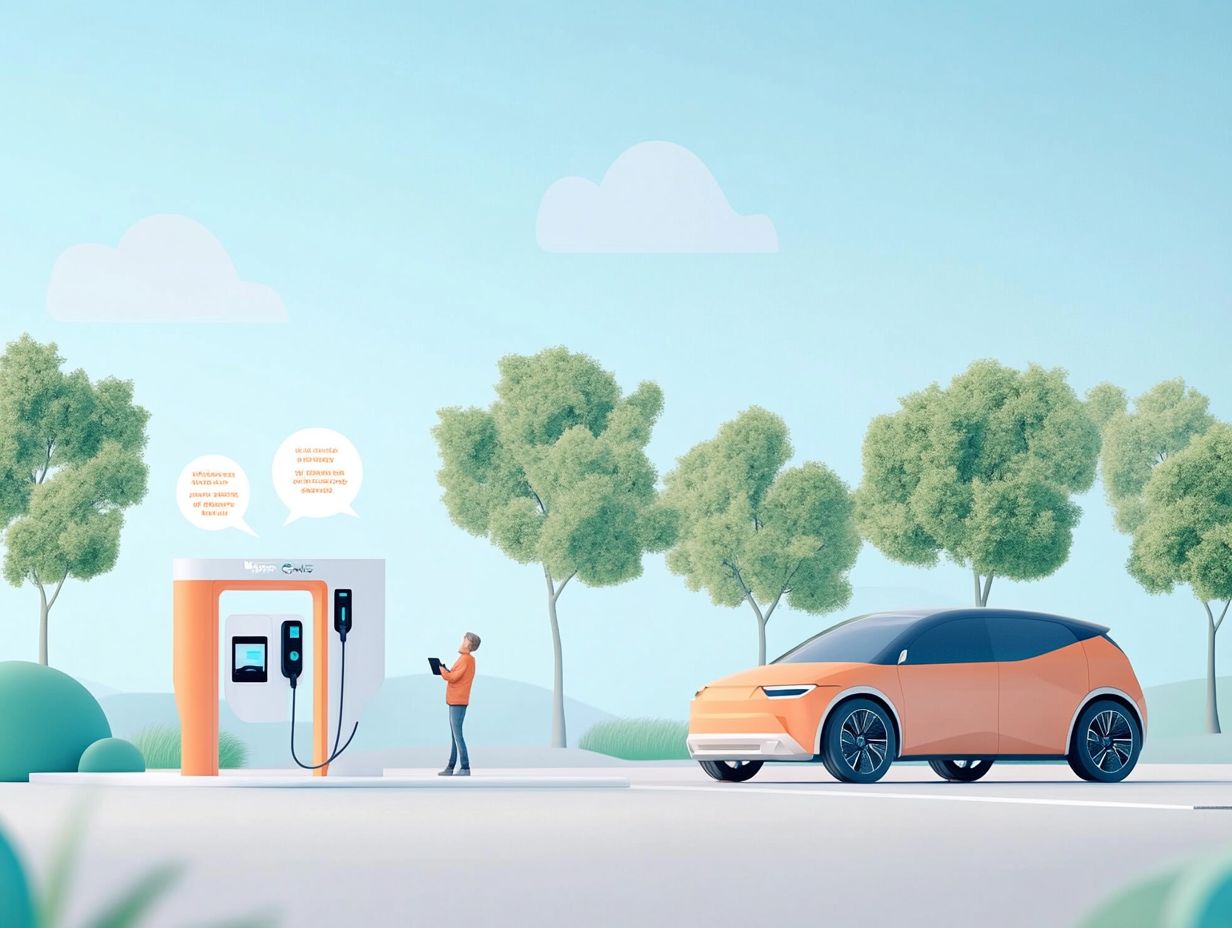
An EV charging station, also known as an electric vehicle charging station, is a device that supplies electricity to charge electric vehicles.
Do all electric vehicles use the same type of charging station?
No, there are different types of electric vehicles, and they may require different types of charging stations. Common types include Level 1, Level 2, and DC Fast charging stations.
How long does it take to charge an electric vehicle?
The charging time depends on the type of charging station and the size of the vehicle’s battery. On average, charging can take anywhere from 30 minutes to 12 hours to fully charge an electric vehicle.
Can I install an EV charging station at my home?
Yes, you can install an EV charging station at your home. However, it is recommended to consult with a licensed electrician to ensure proper installation and safety.
Are all EV charging stations free to use?
No, not all EV charging stations are free to use. Some may require a payment or subscription, while others may be free to use. It is always best to check before using a charging station.
Can I use a public charging station for my electric vehicle if I am not the owner of the station?
Yes, public charging stations are open for use to anyone with an electric vehicle. However, some may require a payment or subscription for use.
Join the green revolution and consider making the switch to an electric vehicle today!

